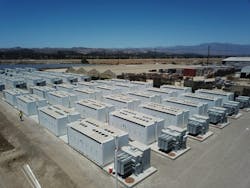Strata Clean Energy Commits 400-MWh Battery Storage Project to Offtake for Arizona Utility
In another sign of how energy storage is impacting utility-scale grid operations, Arizona Public Service (APS) has signed a 20-year tolling agreement with developer Strata Clean Energy.
The agreement supports the 100-ME/400-MWh White Tank Energy Storage project currently in the development stages in Maricopa County near Phoenix. Construction of White Tank is expected to be completed and integrated into the APS energy grid by April 2027.
Under the new tolling agreement, APS will have the flexibility to charge and discharge the system as needed, while Strata Clean Energy will handle operations of the battery storage site.
“During periods of the day when energy demand is highest, APS customers benefit from flexible resources that can quickly serve them with reliable electricity,” said Brian Cole, APS Vice President of Resource Management, in a statement. “The White Tank Energy Storage project will help increase our growing portfolio of innovative energy storage technologies. Resources like this store electricity generated when solar power is abundant. APS operators can later release it to our smart grid to meet customers’ needs when the sun is setting and energy usage increases.”
White Tank is one outcome developed from a request for proposals announced by APS in 2022, seeking up to 1.5 GW in new generation resources. Strata and APS also worked together on another 20-year tolling agreement for the 255-MW/1-GWh Scatter Wash battery storage project also located in the Phoenix area.
APS is the largest electric utility in Arizona, serving more than 1.3 million customers.
Scatter Wash is scheduled to be operational by this coming April. Earlier this spring, Copenhagen Infrastructure Partners announced its acquisition of the Scatter Wash project.
Altogether, Strata Clean Energy is developing 7 GWh in battery storage capacity throughout Arizona, including some 1.6 GWh currently under construction.
“Strata has a pipeline of clean energy projects across the United States that provide effective solutions for power companies to strengthen the grid,” said Tiago Sabino Dias, Chief Development Officer at Strata Clean Energy. “Our experience in developing projects like White Tank enables us to support utilities like APS in reaching their energy goals.”
Strata is also working on numerous solar and storage farm projects nationwide. These include the 10-MWh Springfield energy storage complex in Massachusetts, as well as the 6.8-MW Wentworth Farm solar project in North Carolina.
Energy Storage is One of Many Paths to NetZero
Track them with EnergyTech's free Transitions E-Newsletter
About the Author
Rod Walton, EnergyTech Managing Editor
Managing Editor
For EnergyTech editorial inquiries, please contact Managing Editor Rod Walton at [email protected].
Rod Walton has spent 17 years covering the energy industry as a newspaper and trade journalist. He formerly was energy writer and business editor at the Tulsa World. Later, he spent six years covering the electricity power sector for Pennwell and Clarion Events. He joined Endeavor and EnergyTech in November 2021.
Walton earned his Bachelors degree in journalism from the University of Oklahoma. His career stops include the Moore American, Bartlesville Examiner-Enterprise, Wagoner Tribune and Tulsa World.
EnergyTech is focused on the mission critical and large-scale energy users and their sustainability and resiliency goals. These include the commercial and industrial sectors, as well as the military, universities, data centers and microgrids. The C&I sectors together account for close to 30 percent of greenhouse gas emissions in the U.S.
He was named Managing Editor for Microgrid Knowledge and EnergyTech starting July 1, 2023
Many large-scale energy users such as Fortune 500 companies, and mission-critical users such as military bases, universities, healthcare facilities, public safety and data centers, shifting their energy priorities to reach net-zero carbon goals within the coming decades. These include plans for renewable energy power purchase agreements, but also on-site resiliency projects such as microgrids, combined heat and power, rooftop solar, energy storage, digitalization and building efficiency upgrades.

